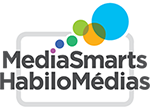Remix Tools: Getting Media
Here are some suggested tools for creating your remix. However, you are not limited to these tools, and you do not have to do a remix using digital technology: you can do “low-tech” remixes as well (physically cutting and pasting from newspaper or magazines, writing stories or drawing comics, making videos, etc.)
Capturing Video
Under Fair Dealing, you should be able to record short clips of videos from online streaming platforms so long as the clips are no more than needed for the purpose and you use the screen recording features built into your computer’s operating system:
Screen recording features built into your computer’s operating system:
- On Windows machines, use the Xbox Game bar. See Xbox Support for more information.
- On Macintosh computers, use the Screenshot toolbar or QuickTime player. See Apple Support for more information.
- On Chromebooks, use Record Your Screen. See Google Support for more information.
Capturing Images
You can also do a screen capture to record still images from your browser. To find out how to do this on different devices and browsers, see take-a-screenshot.org.
If you’re not sure if your use would be Fair Dealing, you can consult the Fair Dealing Decision Tool.
Finding Media
Here are some sources of media that are in the public domain or available under a license that allows them to be used for non-commercial purposes:
Video
- Moving Image Archive
- Video files uploaded by users under a Creative Commons licence.
- Vidsplay
- A collection of free HD video stock footage, free for any use with attribution.
- Mixkit
- Video files uploaded by users
- Public Domain Movies
- Movies that have fallen into the public domain in the United States.
- Open Planet
- Media library free to use for educational storytelling.
Audio
- Freesound
- A collaborative database of Creative Commons licensed audio (sound effects and music) available for download and use.
- SoundBible
- A frequently updated collection of sound effects which are available under various Creative Commons licences, all of which can be used for non-commercial projects.
Images
- PublicWork
- Archive of over 100,000 public domain images from online archives and art galleries.
- morgueFile
- Free high resolution stock photos available for free for any creative purposes—that is, they must be used in the creation of a new work.
- Openverse
- Large library of Creative Commons-licensed media.
- Digital Comic Museum
- Comics that have fallen into the public domain in the United States.
- Pics4Learning
- An image library created specifically for educators and students, the images are uploaded by copyright holders for any uses serving an educational purpose, including use in multimedia projects, websites, videos, etc.
- Openclipart
- A collection of free vector clip art in the public domain.
- Flickr.com
- A huge collection of photos in the public domain or licensed under various Creative Commons licences. You can search Flickr images by licence type.
- Pexels
- Royalty-free images and videos
- Smithsonian Open Access
- Almost 5 million 2D and 3D digital items from the Smithsonian collection.
You can search for works covered under Creative Commons licenses using the CC Search Engine. Before using a work, make sure that your use is covered by its particular license; you can learn more about CC licenses at the Creative Commons website.
Protecting Your Work
Anything you make is automatically copyrighted so long as making it involved “an exercise of skill or judgment.”
- If you’d like to release something you’ve made under a Creative Commons license, you can learn more at the Creative Commons website.
- If you would like to keep anything you make, including photos, from being used to train AI, you can use the tools Glaze (which “hides” images from AI models) and Nightshade (which “poisons” AI models that try to train on them.)
- The Glaze app, which runs on Mac and Windows computers, can be downloaded for free
- There is also a browser version of Glaze.
